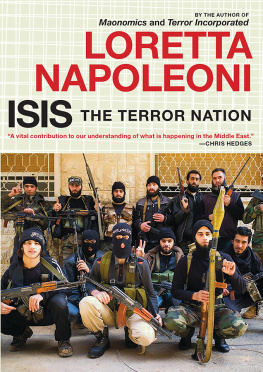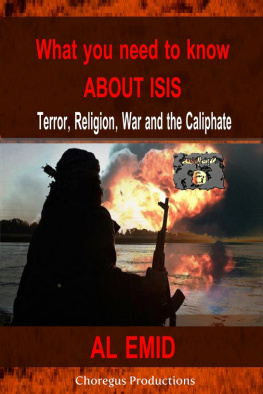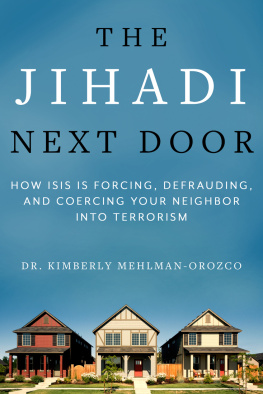Loretta Napoleoni - ISIS: the terror nation
Here you can read online Loretta Napoleoni - ISIS: the terror nation full text of the book (entire story) in english for free. Download pdf and epub, get meaning, cover and reviews about this ebook. year: 2017, publisher: Seven Stories Press, genre: Politics. Description of the work, (preface) as well as reviews are available. Best literature library LitArk.com created for fans of good reading and offers a wide selection of genres:
Romance novel
Science fiction
Adventure
Detective
Science
History
Home and family
Prose
Art
Politics
Computer
Non-fiction
Religion
Business
Children
Humor
Choose a favorite category and find really read worthwhile books. Enjoy immersion in the world of imagination, feel the emotions of the characters or learn something new for yourself, make an fascinating discovery.
- Book:ISIS: the terror nation
- Author:
- Publisher:Seven Stories Press
- Genre:
- Year:2017
- Rating:4 / 5
- Favourites:Add to favourites
- Your mark:
- 80
- 1
- 2
- 3
- 4
- 5
ISIS: the terror nation: summary, description and annotation
We offer to read an annotation, description, summary or preface (depends on what the author of the book "ISIS: the terror nation" wrote himself). If you haven't found the necessary information about the book — write in the comments, we will try to find it.
ISIS: the terror nation — read online for free the complete book (whole text) full work
Below is the text of the book, divided by pages. System saving the place of the last page read, allows you to conveniently read the book "ISIS: the terror nation" online for free, without having to search again every time where you left off. Put a bookmark, and you can go to the page where you finished reading at any time.
Font size:
Interval:
Bookmark:

Seven Stories Press
New York / Oakland / London
Copyright 2014, 2017 by Loretta Napoleoni
This is an updated edition of The Islamist Phoenix, published in 2014 by Seven Stories Press
All rights reserved. No part of this book may be reproduced, stored in a retrieval system, or transmitted in any form or by any means, including mechanical, electronic, photocopying, recording, or otherwise, without the prior written permission of the publisher.
Seven Stories Press
140 Watts Street
New York, NY 10013
www.sevenstories.com
College professors may order examination copies of Seven Stories Press titles for free. To order, visit http://www.sevenstories.com/ contact or send a fax on school letterhead to (212) 226-1411.
Book design by Jon Gilbert
Library of Congress Cataloging-in-Publication Data
Names: Napoleoni, Loretta, author.
Title: ISIS : the terror nation / Loretta Napoleoni.
Other titles: Islamist phoenix Description: Second edition. | New York :
Seven Stories Press, 2017. | First
edition published as: The Islamist phoenix : the Islamic
State and the redrawing of the Middle East.
New York: Seven Stories Press, 2014. |
Includes bibliographical references.
Identifiers: LCCN 2017024597 | ISBN 9781609807252
Subjects: LCSH: IS (Organization) | Middle East--History--21st century.
| Islamic fundamentalism--History--21st century. | Terrorism--Middle
East.Classification: LCC HV6433.I722 N365 2017 |
DDC 956.05/4--dc23
LC record available at https://lccn.loc.gov/2017024597
Printed in the United States
9 8 7 6 5 4 3 2 1
To Giuseppe
Thank you for your support
The rise to power of the armed organization that in June 2014 took the name Islamic State has been swift and, until recently, largely undetected. In recent years this group has frequently changed its name. Originally part of Abu Mussab al Zarqawis organization Tawhid al Jihad, it later became the Islamist State in Iraq (ISI), which eventually merged into al Qaeda in Iraq. In 2010, when Abu Bakr al Baghdadi became its leader, the group reverted to its former appellation the Islamic State in Iraq. In 2013, following its merger with a section of Jabhat al Nusra, a Syrian jihadist group affiliated with al Qaeda, the organization renamed itself Islamic State in Iraq and the Levant (al Sham), better known by the acronym ISIL or ISIS. Finally, just before the declaration of the Caliphate, ISIS became the Islamic State. In Syria, however, right from the beginning, and today in Iraq also, the group has been known simply al Dawlat, the State.
Each new term corresponds with major developments and important changes in the life of the organization. As such, the semantics of the Islamic State constitute one additional piece of the Middle Eastern political puzzle that the West and the world are trying to put together.
The name al Tawhid al Jihad, often translated as Monotheism and Jihad, conveys a sense that God is everything and everywhere; life can exist only within His rule. Accordingly, Muslims consider the original Islamic State, the first Caliphate, the seventh-century creation of the Prophet Mohammed and his companions, a perfect society ruled by divine mandate. In short, it was the political expression of the will of God. Today, the trademark gesture of al Tawhid, the thrusting of ones index finger to the sky, has become the all but official salute of the contemporary Islamic State.
The transition from al Tawhid al Jihad to the Islamic State in Iraq coincided with the efforts of al Zarqawis armed group to focus on Iraq, to confine its jihad to this country, as a launching pad to re-establish the Caliphate. In similar fashion, al Baghdadis decision to add the words al Sham, the ancient Arabic denomination of Damascus and surrounding territories, from which some of the first Caliphs ruled, represents a step forward from his predecessor and marks the beginning of a cross-border effort to achieve the organizations final goal: the reconstruction of the Caliphate.
The birth of the Islamic State, the newest name taken by ISIS, just a day before the declaration of the establishment of the Caliphate, signifies a major new stage of nation-building, the process of recreating the circumstances that in the seventh century led to the establishment of Islams ideal society.
Today, Western media and politicians use various designations to describe the armed organization led by al Baghdadi. The White House and Downing Street use ISIL, while the US media prefers ISIS. PBS, however, favors the Islamic State, while some in the Australian media have adopted the terminology Islamic State Group, to avoid giving the impression that it is a state instead of an armed organization. Overall in English, the acronymic ISIS and ISIL sound better than IS, hence their popularity. The reluctance of politicians to use the word state springs from the fear of accepting, if only with a word, the claim of the Islamic State to be not a terrorist organization, but a state legitimized by a war of conquest and internal consensus.
In the course of this book I have used the term Islamic State because this is how the group has most recently defined itself and likely how it will continue to be known. It is my opinion that the term Islamic State carries a much more realistic message to the world than does ISIS or ISIL. This message conveys the groups determination to succeed at building the twenty-first-century version of the Caliphate. Using less precise acronyms for propaganda reasons, for example, to hide the true nature of the Islamic State, will not help us face the current threat. On the contrary, it will most likely, yet again, prevent us from developing an ad hoc strategy to bring peace once and for all to the Middle East.
Europe is on fire. Over the last two years many European targets have been hit by the followers of the Islamic State. France, in particular, has fallen victim to several attacks to the extent that many analysts have said that terrorism is the new normal.
The Mediterranean is on fire. There have been attacks in Tunisia, Libya, Egypt, Turkey, even in Nice, and since the summer of 2015 a massive wave of refugees has reached the coasts of Greece and Italy, fleeing the political destabilization of the Middle East, and of parts of Asia and Africa. While initially the European Union opened its borders to the biggest exodus since World War II, in the spring of 2016 an agreement was reached with Turkey to block those seeking to reach Europe. But the failure to solve the political crisis in the Middle East has eroded the cohesion of a region, one that encompasses Europe and the non-European Mediterranean states, a region that is crucial for the stability of the West.
In June 2016 the Brexit vote and in July of the same year the attempted coup in Turkey confirm that destabilizing processes are also in motion within the European Union itself, and within one of its most important political and military allies and a NATO member.
Even across the Atlantic the impact of the Middle Eastern crisis has fuelled a resurgence of political violence. ISIS followers have staged smaller scale attacks than the ones in Europe, but they are equally upsetting because they confirm the strong appeal that the Islamic State has worldwide, from Africa to Asia, from Europe to North America. What we are facing is no longer simply a terror state but also a global ideology that is presented and perceived as an anti-imperialist alternative, arguably the only such alternative front that is openly challenging the culture, the political model, in short the world order established by the West.
Font size:
Interval:
Bookmark:
Similar books «ISIS: the terror nation»
Look at similar books to ISIS: the terror nation. We have selected literature similar in name and meaning in the hope of providing readers with more options to find new, interesting, not yet read works.
Discussion, reviews of the book ISIS: the terror nation and just readers' own opinions. Leave your comments, write what you think about the work, its meaning or the main characters. Specify what exactly you liked and what you didn't like, and why you think so.




